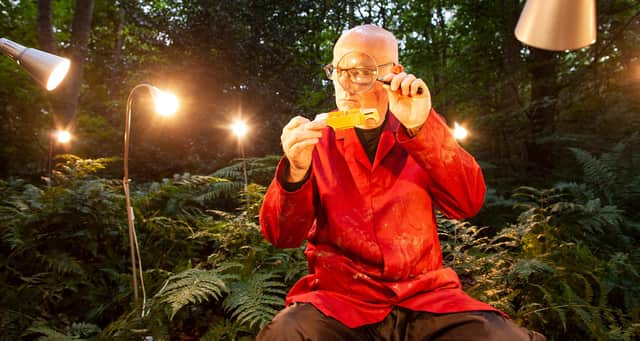Fringe theatre reviews: Doppler | Still | S.E.X


It's been a long journey, for the latest show from Edinburgh-based Fringe stars Grid Iron. First planned for performance at the 2020 Fringe, Doppler (*****) has since been cancelled because of the Covid-19 pandemic, and reimagined as a screen documentary, Doppler - The Story So Far. Yet the live show has now come to rest in a glorious woodland glade at Newhailes House that seems as if it might have been made for this production; and the tale that unfolds here emerges as a mightily complex and disturbing meditation for our time, delivered with a light-touch brilliance - and a strong sense of comedy - that never obscures the significance of the themes in hand.
Based on an novel by Norwegian writer Erlend Loe, Doppler is the story of a modern Norwegian man who has everything - wife, two kids, nice home in Oslo, good job. Yet one day, when he falls off his bike in a forest near the city, he suddenly feels that he has to stay there, and not go home. He sets up camp in the forest, kills an elk for a winter food supply, and starts to learn the art of doing very little at all, particularly after he forms a companionable relationship with the elk’s orphaned calf.
At a comedic level, Doppler’s story is the tale of how life - in the form of his pregnant wife, his little son, a local landowner, his troubled friend Dusseldorf - keeps coming to find him, even in his forest hideaway. Beneath the surface of this powerfully entertaining narrative, though, more troubling dymamics are at work. Doppler thinks he is a leftist and a radical; yet his attitude to his wife is frankly shocking, and as the winter wears on, he becomes utterly absorbed in the patriarchal project of making a huge totem pole to honour his recently dead father, finally taking his young son, and heading off into deeper wilderness, on a “military campaign” to find more “room to breathe”.
All of this has alarming overtones in European history; and it is a measure of the brilliance of Keith Fleming’s performance as Doppler that he encompasses every aspect of this hugely complex character with apparent ease and immense storytelling skill, almost like a latter-day manifestation of the Peer Gynt he once so brilliant played in Dundee. In Ben Harrison’s flawless production, all the other roles in the story - from the baby deer to the troubled Dusseldorf - are played with terrific flair by Chloe-Ann Taylor and Sean Hay; and the woodland setting is gloriously designed and lit by Becky Minto and Elle Taylor, creating a space in which the audience are invited to think long and hard about how far we can follow Doppler on his journey, before, somewhere in the forest, we reach a line we know we should not cross.
Frances Poet’s Still (****), which premiered at the Traverse this week, is a play about a different kind of journey, between life and death. Set in Edinburgh right now, Still follows five characters on their way, as they navigate their encounters with mortality. There’s Gaynor, who has been sitting still for years as a way of dealing with chronic pain. There’s her son Dougle and his partner Ciara, preparing for the birth of their first child. There’s Gilly, a young folk singer with a terrific voice and a dying Dad; and there’s Mick, a game old party animal whose slightly surreal adventures around town make little sense, until we finally realise who he is.
There is a limit, in the end, to just how interesting tales of human mortality can be; every loss, of the kind described here, is both terrible and ordinary, and now dwarfed by the crisis facing humanity as a whole. Yet every detail of Poet’s play is written and presented with such artistry that it lifts the heart by the sheer force of its beauty and eloquence. Gareth Nicholls’s production looks and feels magical; and the acting company of Molly Innes, Martin Donaghy, Gerry Mulgrew, Mercy Ojelade and Naomi Stirrat rise brilliantly to the challenge of Poet’s thoughtful text, with a fine folk-inflected score by onstage musician Oguz Kaplangi to help carry them through, to the end.
Mamoru Iriguchi’s latest show Sex Education Explorers (S.E.X.) (****), by contrast, is one of those genial and self-consciously hand-knitted productions that flourish mightily on the Fringe, offering cheery examples of art that conceals art, sometimes almost too much. In a spoof senior-school lecture that might have been designed to send critics of modern gender theory into meltdown, Iriguchi and and his fellow-performer Afton Moran briskly divide humanity not into men and women but into “eggers”, “spermers”, “bothers”, and “neitherers”; and then dive into a historic investigation of how sexual reproduction came to exist at all, and how some of its social consequences have been far from positive.
The whole show is merrily illustrated both with irresistibly comic props and costumes, and with clever graphics wittily projected on an on-stage screen. And if Iriguchi’s final vision of a new and fluid sexual paradise, no longer plagued by rigid gender identities, seems a shade utopian for our cataclysmic times, he and Afton Moran approach the whole issue with an engaging self-deprecation and doubt that is altogether human, and tremendously attractive, too.
Doppler is at Newhailes House until 23 August. Still I sat the Traverse Theatre until 22 August. S.E.X. is at Summerhall until 29 August.